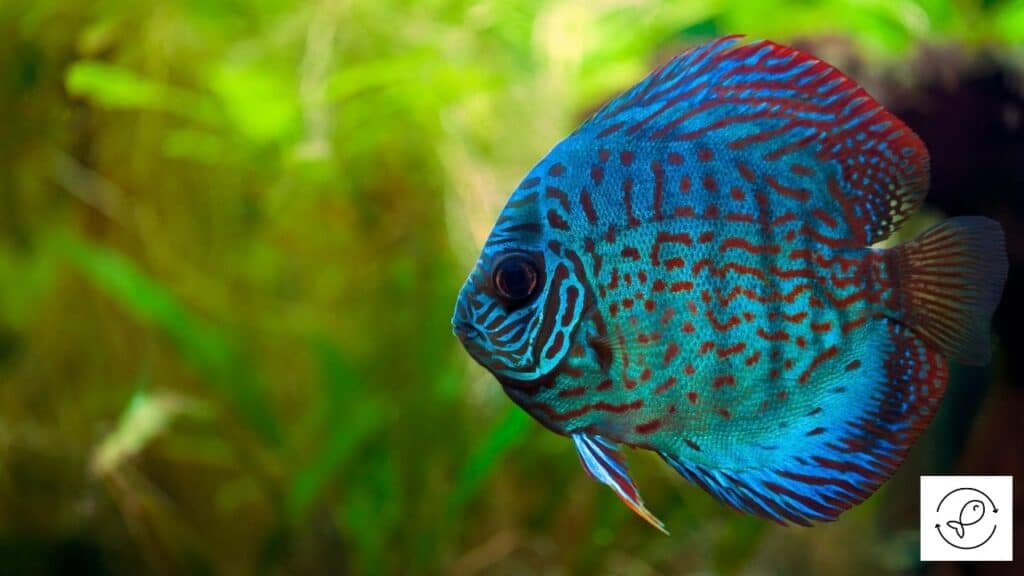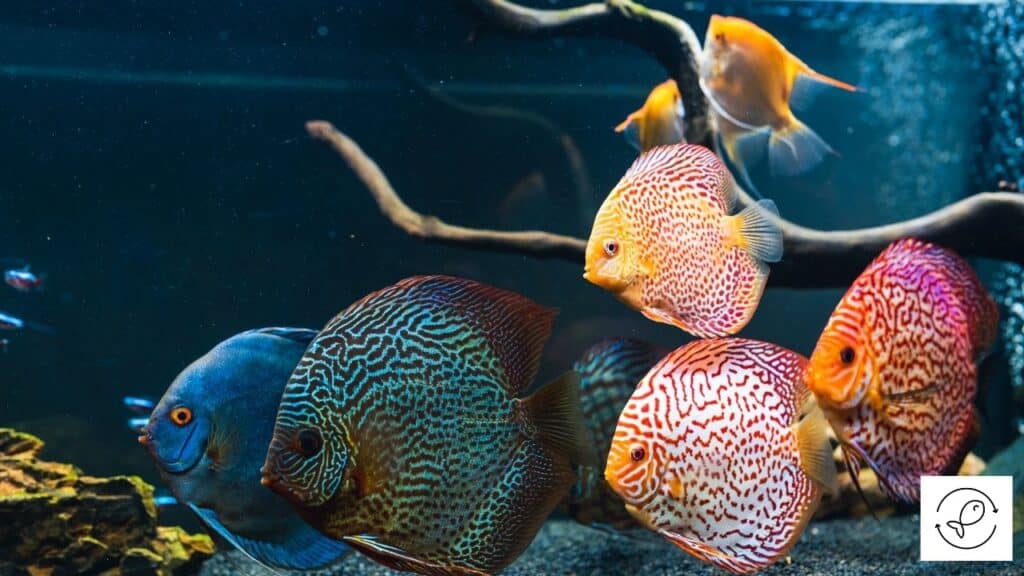Discus fish grow up to 7 or even 9 inches in length when kept in warm conditions. Although these fish can live up to 15 years, they achieve complete growth at approximately 2 to 2.5 years. Warm water temperatures help improve their metabolism, develop better colors, and stimulate faster growth.
Let’s now understand how to grow discus fish faster and bigger in more detail.
Tips To Grow Discus Fish Faster And Bigger
Discus is a beautiful fish that can grow up to 9 inches in length.
However, unlike many aquarium fish, discus need excellent water conditions and a conducive tank environment to stimulate growth.
Given below are some tips that can help discus fish grow faster and bigger.
Proper Diet
Adequate nutrition is essential for growth. Feeding discus fry with a protein-rich diet will stimulate faster growth.
It’s best to feed live food than flakes to discus fish for adequate nutrition. Some foods that they enjoy are brine shrimp and frozen bloodworms.
Daily Water Change
Discus fish need pristine water conditions to flourish. So you should change about 30% of the tank water every day.
If changing the water every day isn’t feasible, you should at least do a 50% water change over a couple of days.
You should do this to keep the tank water as clean as possible.
If there are any bacteria or toxins present in the water, they can make it difficult for the young discus fish to grow.
So maintaining a healthy fish environment ensures faster growth.
Warm And Clean Water
Discus fry will struggle when placed in colder water conditions, and it can hinder their growth.
So you must provide the fry with warm and stable water temperatures to stimulate growth.
Discus fish prefer water temperature in the range of 82°F to 88°F (28°C to 31°C).
However, you must note that the dissolved oxygen is less at higher temperatures. So it’s vital to maintain adequate oxygen levels.
Ideal Water Parameters
Discus fry need a water pH level between 6.0 to 7.8. A pH level of 6.5 is ideal for them.
In addition, relatively soft and acidic water conditions are conducive to their faster growth.
Small Tank
Note that we’re talking about discus fry here and not the adult discus.
When young fish are kept in a small tank, they can conserve a lot of their energy by swimming less in the small tank.
The energy saved by the fry will help them to grow faster.
Large tanks allow fish to establish a pecking order and create unnecessary stress for the tank inhabitants.
Ideal Group Size
If discus fry are kept in a group of ten or more, they won’t establish a pecking order.
This will ensure that they grow fast at a younger age by living in a stress-free environment.
A pecking order keeps the young discus from growing evenly, and some fry tend to grow bigger than others.
The weaker fish can also have stunted growth due to inadequate eating opportunities.
If there’s no pecking order, each discus fry gets an equal share of the food that’s put in the tank.
Regular Tank Maintenance
Regular maintenance and cleaning of the discus tank water are essential.
This prevents ammonia build-up, keeps the water clean, and helps the discus fry grow faster.
The build-up of ammonia can hamper fish growth and cause them a lot of stress, leaving them susceptible to diseases.
So changing 30% of the tank water every day is recommended to stimulate faster growth in discus fry.
How Long Does It Take For Discus To Grow?
Young discus fish usually grow rapidly. However, once they reach about 4 or 5 inches, their growth slows down significantly.
Their growth rate also slows down as they reach the size of about 6 or 7 inches.
Feeding discus fry with high protein foods will help them grow faster.
Besides feeding them protein-rich food like brine shrimp and bloodworms, it’s also essential to feed them regularly.
Until the age of 3 months, feed them 10 to 12 times per day. Between 3 to 12 months, feed them 5 times per day.
Once they reach the age of 12 months, feed them 2 to 3 times per day.
Keep in mind that the main thing to stimulate growth in discus fry is to provide them with a healthy environment.
Keeping them in warm water will boost their metabolism.
Focussing on feeding a high protein diet at regular intervals and frequent water changes will also stimulate faster growth.
Why Isn’t Your Discus Fish Growing Faster?
Discus fish in captivity have recorded growth up to 9 inches in length. However, not all captive discus reach that length.
Many aquarists complain about the slow growth rate of their discus fish.
Given below are the reasons why your discus fish might not be growing faster.
Poor Genetics
Discus breeds with poor genes produce poor quality fry. Such discus fry will not grow fast because of this genetic defect and will never grow to their full potential.
So buying adult-sized discus fish for your aquarium is recommended. This way, you will know that the fish is of a good breed and can pass on its good genes.
Low Protein Diet

If the diet provided to your discus is low in proteins, then the fry will not grow fast.
An excellent way to ensure that your discus has enough protein is to feed them live brine shrimp.
Many new fish enthusiasts make the mistake of overfeeding their fish.
Overfeeding can cause fish obesity, which leads to a whole list of problems and a dirty tank that can hamper their growth.
Too Much Ammonia Build Up
Poor tank maintenance will result in dirty aquarium water, which stimulates bacterial growth and create a lot of ammonia that will make your discus sick and weak.
Discus fish need pristine water conditions to thrive. They will struggle to grow in the absence of good water quality.
So it’s best to maintain a healthy environment for your discus.
Cold Water Temperatures
Discus are sensitive fish and prefer warm water temperatures. If they’re kept in cold conditions, they will struggle with lower metabolism.
As a result, they will have reduced appetite and other problems like lower growth, dull colors, and poor health.
So keep the water temperature in the range of 82°F to 88°F (28°C to 31°C) for better results.
Overcrowding
The most common cause of the slower growth rate in discus fish is overcrowding of the fish tank.
You must note that discus fish need more space than other aquarium fish.
The size of the aquarium is equally important for discus fish.
Discus fish grow to become quite large and need an aquarium of at least ten gallons per fish when they reach full size.
Reduced Oxygen Levels
Discus prefer warm water conditions as it improves their metabolism and assists in growth.
However, there’s also a flip side. Warm water has lower oxygen levels, which stresses the fish.
So to increase the oxygen level, you can use a robust filter that agitates the water surface to facilitate gas exchange.
It will also help distribute the oxygen evenly throughout the tank.
Stunted growth is an issue commonly found among discus fish. It’s caused by improper diet, lack of proper care, and poor environment.
So it’s essential to take note of any signs that indicate stunted growth and provide the discus fish with the required environment to stimulate faster and better growth.
Can Stunted Discus Grow?
Some fish owners face growth problems with their discus. Fish experts term this improper growth of discus fish as stunted discus.
Given below are the causes, signs, and possible solutions for stunted growth in discus fish.
Causes Of Stunted Growth In Discus
Given below are the causes of stunted growth in discus fish:
- Poor genetics acquired by the fry from its parents can result in inadequate growth.
- You are feeding your discus fish carelessly without understanding their dietary requirements at different life cycle stages.
- You are feeding food lacking in proteins required to stimulate growth in your fish.
- You aren’t maintaining the required water temperature range to help the fish stay healthy and thrive.
- Irregular water changes and tank maintenance have resulted in poor tank conditions.
- The fish tank is overcrowded, resulting in stress on the young discus.
- A robust filtration system isn’t installed to maintain adequate oxygen levels.
Signs To Identify Stunted Growth In Discus
Given below are the signs that can help you identify stunted growth in discus:
- The body shape of the fish resembles a football or bullet.
- Fish eyes are relatively big compared to their body size.
- The eyes of the fish are asymmetrical, where one eye is higher on the face than the other.
- The fish eyes are of different sizes, where one eye is larger or smaller than the other.
- Despite getting proper care, adequate food, and a healthy environment, a particular fish isn’t growing like the other fish.
Common Solutions To Stunted Growth In Discus
Given below are some solutions to help discus fish with stunted growth to grow to their standard size:
- Understand the dietary requirements of your fish at different stages of their life cycle and provide them adequate nutrition.
- Focus on giving them a protein-rich diet, including brine shrimp, beef daphnia, bloodworms, etc.
- Maintain a higher temperature range to boost metabolism and stimulate growth.
- Provide pristine tank conditions with regular water changes and tank maintenance.
- Buy discus in batches of the same size or age. Also, ensure that there’s enough space for every discus inside the tank. The general rule is to provide 10 gallons of water per fish.
- Install a robust filtration system that maintains an adequate oxygen level and distributes it evenly throughout the tank.
However, poor genetics will not change with the change in conditions.
So the growth of your fish will be stunted no matter how well you take care of your aquatic pet.


Good article 😀👍